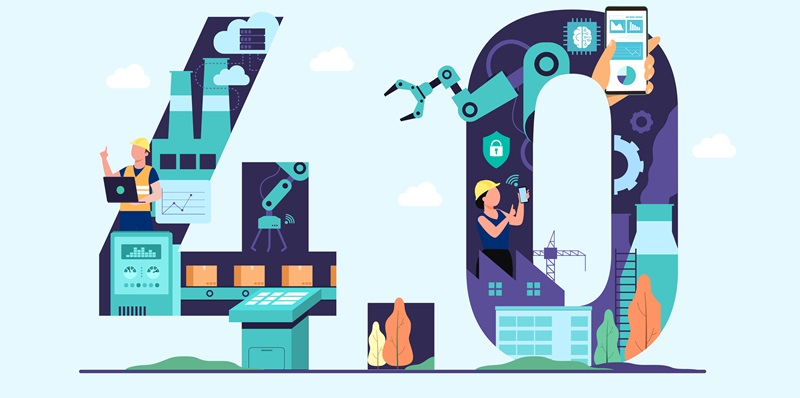The term Industry 4.0 heralds an era of transformation, marking a distinctive pivot from erstwhile manufacturing norms to a new world dominated by cutting-edge technological integration. This seismic shift has restructured the landscape of global industries, invoking a synthesis of the digital and physical worlds to redefine production, innovation, and competitive advantage. Poised at the juncture of this revolution, businesses and societies grapple with the enormity of change, which carries the weight not just of operational enhancement but also of ethical, societal, and economic implications. As the chorus of machinery melds with digital networks, the scenario unfolding is one of profound upgrades in efficiency and a reorientation toward making industries smarter, agile, and more sustainable.
Industry 4.0 is more than a mere upshift in technological capabilities—it’s a transformative wave that amalgamates AI, IoT, and robotics into the very fabric of manufacturing. This conversion heralds a grand redesign of how we perceive, engineer, and distribute products. It is birthed from a lineage of industrial revolutions that incrementally unfurled, each layering upon the last to propel societies into newfound productivity and ingenuity. With Industry 4.0, the narrative is one of unprecedented convergence—between cutting-edge tech and intricate human needs—that seeks to balance mass production with mass customization, driven by nuanced data and intelligent analytics.
The chronicles of industrial prowess stretch back to the first revolution where steam power emancipated productivity from mere human toil. Successive waves of electrical and computing breakthroughs augmented this momentum, each revolution redefining the mechanisms of its era. Industry 4.0 stands on the shoulders of these giants, morphing the energy of their breakthroughs into a digital renaissance. This revolution not only imprints smarter operations onto the industry’s burgeoning canvas but introduces sustainability as a central doctrine, influencing the future of production.
Strategic Advantages and Sustainable Operations
In the transformative phase of Industry 4.0, real-time data management is revolutionizing operational efficiency. Decision-making is more agile, informed by insights from a network of interconnected devices. Manufacturing is no longer just about making identical products but is instead shifting toward mass customization, meeting unique consumer needs with flexibility.
This shift is proving to be beneficial not just in terms of competitiveness but also in terms of sustainability. Industries are now strategically using resources, reducing energy use, and cutting waste, which helps in meeting both economic and environmental goals. The rise of Industry 4.0 signifies a move toward sustainable practices that resonate with eco-conscious consumers and reflect a commitment to environmental responsibility. This new industrial era promises a harmonious balance between advancing technology and preserving natural resources.
Overcoming Industry 4.0 Challenges
Navigating the fourth industrial revolution demands a deft combination of enthusiasm for innovation with guarded caution. As we blend increasingly complex networks with our industrial infrastructures, the specter of cybersecurity looms large. Data integrity becomes paramount, compelling institutions to fortify their digital bulwarks against threats that accompany hyperconnectivity. Concurrently, the surge in automation beckons a shift in workforce dynamics; the skillful mix of technology and talent calls for a workforce whose education is as fluid as the technology they work alongside.
The rush toward a robot-assisted future, while brimming with productivity gains, must be tempered with ethical contemplation. Considerations range from the potential for job displacements to the social shockwaves of creating a digital divide. Businesses and policymakers are tasked with navigating these choppy waters, ensuring the benefits of automation and smart industries don’t exacerbate societal fractures but rather unify through shared growth and inclusive advancement.
The Far-reaching Impact of Industry 4.0
The ripples of Industry 4.0 journey far beyond the immediate shores of factories and production lines. This industrial wave is set to recast the very essence of supply chains, reshape customer engagement, and redefine the face of the global workforce. As the foundational stones of this revolution cement themselves within the modern economic framework, the potential for incessant innovation stretches on the horizon, awaiting exploration.
Articulated with conviction by visionaries like José María Álvarez-Pallete, the scope of Industry 4.0 eclipses its technological framework, rising as a cultural and societal wave that reshapes our collective destinies. Recognized not just as an upgrade to our tools and systems, but as a reimagining of how we interact with our world, this revolution demands a proactive, aware, and thoughtful approach. Engaging with the era of Industry 4.0 is to strategically unlock a treasure trove of potential, ensuring that as the wheel of progress turns, it does so with a balanced and considered hand.

